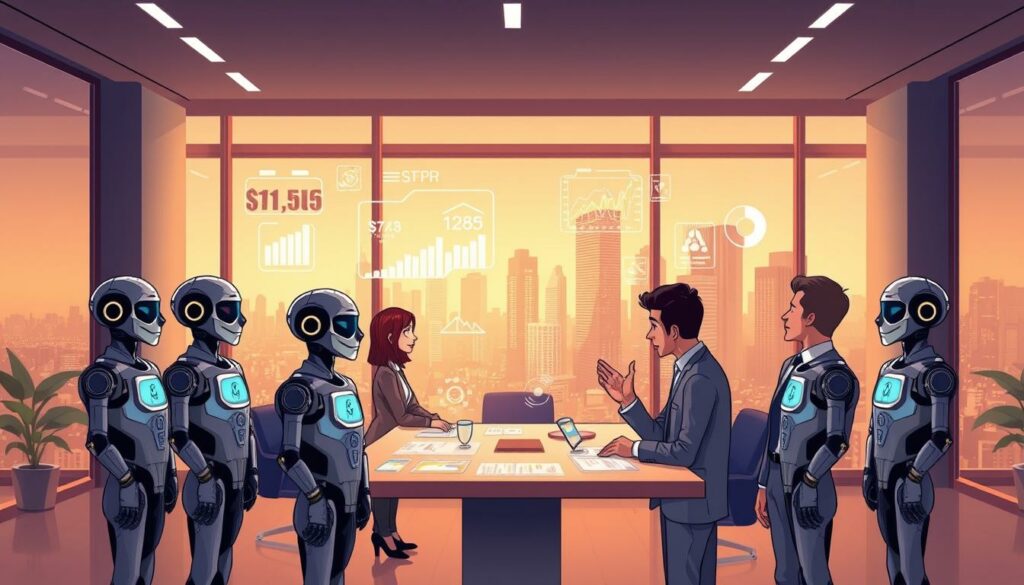We are on the cusp of a significant transformation in the business landscape. This is driven by the advent of AI agents. These are autonomous software entities that can perform tasks and make decisions without constant human help.
As businesses start using these intelligent systems, the market is expected to grow a lot. It will go from $7.84 billion in 2025 to $52.62 billion in 2030. This shows the huge impact artificial intelligence agents can have on business operations.
To understand this impact, it’s key to know what an AI agent is and what it means. An AI agent is made to work on its own. It makes decisions based on data analysis and set goals.
Key Takeaways
- AI agents are changing the business world with their ability to work on their own and make smart decisions.
- The market for AI agents is expected to grow a lot by 2030.
- It’s important for businesses to understand the AI agent definition to use this technology effectively.
- AI agents can do tasks without needing constant human help, making operations more efficient.
- More businesses will start using AI agents as they see their value.
What is an AI Agent?
As businesses use more artificial intelligence, knowing what an AI agent is is key. AI agents are changing how businesses work. They mix automation with smart decision-making.
Definition of AI Agents
AI agents are advanced software that can do tasks on their own. They make choices based on detailed data analysis. These agents can learn, adapt, and talk to humans in a useful way.
At their heart, AI agents do specific jobs. They can handle simple tasks or solve complex problems. They use smart algorithms and learn from data to get better with time.
Key Features of AI Agents
AI agents work well because of a few important traits:
- Autonomy: AI agents work alone, making choices without people.
- Learning Capability: They get better with data and time.
- Adaptability: AI agents adjust to new situations and changes.
- Interactivity: They can talk to humans and other systems, making communication smooth.
Knowing these traits helps businesses see how AI agents can change their work and spark new ideas.
The Rise of AI Agents in Business
AI technology has grown fast, making AI agents key in today’s business world. They change how things work. It’s important to know how AI agents fit into business and what’s making them popular.
Historical Context
AI agents have been around for years. But, new tech in machine learning and natural language has made them better for business. At first, they were simple. Now, they can learn and change with new situations.
Important moments in AI agent history include:
- Machine learning algorithms that let AI agents learn from data.
- Improvements in natural language processing, making AI agents better at talking to people.
- More advanced AI designs that can tackle tough tasks and make choices on their own.
Current Trends
AI agents are now used in many fields. They help make things more efficient, improve customer service, and help make better decisions. Some trends today are:
- More Use in Customer Service: AI chatbots and virtual assistants help with customer support 24/7. They make responses faster and cut costs.
- Predictive Analytics: AI agents help analyze big data, predict trends, and guide business plans.
- Working with IoT Devices: AI agents team up with IoT devices to boost automation and make decisions quicker.
As AI agent tech keeps getting better, we’ll see new uses in business. AI agents are becoming more important for business success. Companies that use them first will likely stay ahead.
Benefits of AI Agents for Companies
Companies are using AI agents to make their processes better, save money, and give better customer service. AI agents take over routine tasks, letting humans do more creative work. This makes everything more productive.
Cost Efficiency
One big benefit of AI agents is saving money. They can do many tasks without needing more people, which lowers labor costs. They also work all the time, making businesses more efficient.
For example, AI chatbots can answer customer questions anytime. This means customers get help fast and businesses don’t need to hire as many people. It saves money and keeps customers happy.
Improved Customer Experience
AI agents help make customer service better by giving personalized and instant help. They use data to understand what customers like, making interactions better. This makes customers happier and more loyal.
AI can also suggest products based on what customers like. This makes customers more likely to buy and stay loyal. It’s a win-win for both the customer and the business.

Enhanced Decision-Making
AI agents help businesses make better choices by analyzing lots of data. They find patterns and trends that humans might miss. This helps businesses stay ahead and make smart decisions.
For example, AI can predict sales trends. This lets businesses adjust their plans to meet those trends. It’s a powerful tool for staying competitive.
In short, AI agents are key for saving money, improving customer service, and making better decisions. As more businesses use AI, they’ll get better at what they do and stay ahead of the competition.
Types of AI Agents
AI agents are designed to tackle various challenges and opportunities in the business world. They are mainly categorized into two types: chatbots and virtual assistants, and predictive analytics agents.
Chatbots and Virtual Assistants
Chatbots and virtual assistants are AI tools that interact with humans. They offer customer support, answer questions, and help with tasks. These agents use natural language processing (NLP) to understand and reply to user inputs.
Key applications of chatbots and virtual assistants include:
- Customer service and support
- Booking and appointment scheduling
- Providing product information and recommendations
By automating routine inquiries and tasks, businesses can free up human resources for more complex and value-added activities.
Predictive Analytics Agents
Predictive analytics agents are AI systems that analyze historical data and forecast future trends. They help businesses make informed decisions. These agents use machine learning algorithms to identify patterns and predict outcomes.
Benefits of predictive analytics agents include:
- Enhanced decision-making capabilities
- Risk mitigation through predictive insights
- Improved operational efficiency
By integrating predictive analytics agents into their operations, businesses can gain a competitive edge by staying ahead of market trends.
How AI Agents Work
To understand AI agents, we need to look at the technologies behind them. This includes machine learning and natural language processing. These tools help AI agents gather, process, and analyze big data. They offer deep insights into market trends, customer behavior, and how operations are running.
Machine Learning and Data Processing
Machine learning is at the core of AI agents. It trains algorithms on data for predictive modeling and decision-making. AI agents use machine learning to spot patterns in complex data. This lets them make smart decisions without being programmed.
Data processing is also key for AI agents. They can handle huge amounts of data from different sources. By processing this data, they uncover valuable insights. This is vital for businesses to understand their operations, find ways to improve, and make decisions based on data.
Natural Language Processing Capabilities
Natural Language Processing (NLP) is essential for AI agents to talk to humans naturally. NLP helps AI agents grasp the meaning of human language, including context and syntax. This makes human-agent interaction more effective.
NLP lets AI agents do many tasks, like text analysis and language translation. This is super useful for customer service chatbots. They can understand and answer customer questions accurately and helpfully.
By combining machine learning, data processing, and NLP, AI agents become powerful tools for businesses. They can improve operations, enhance customer experiences, and drive innovation. As we dive deeper into AI agents, it’s clear they have a huge impact on businesses.
Implementing AI Agents in Business
Adding AI agents to business operations is a detailed process. It starts with checking the quality of data and if the systems are ready. Businesses must think deeply about how they work and what drives them.
Steps to Integrate AI Agents
To integrate AI agents well, follow a clear plan:
- Assess Data Quality: Make sure the data for AI training is correct, full, and right for the task.
- Evaluate Infrastructure Readiness: Check if the current IT setup can handle AI agents.
- Define Business Objectives: Clearly say how AI agents will help meet business goals and make things better.
- Choose the Right AI Solution: Pick AI agents that fit the business needs and goals.
- Implement and Monitor: Put AI agents in place and keep an eye on how they do to make sure they meet expectations.
By following these steps, businesses can add AI agents to their work. This makes them better and more efficient.
Overcoming Implementation Challenges
But, adding AI agents can face some hurdles. These include worries about data privacy, fitting with old systems, and making sure AI decisions are clear.
| Challenge | Solution |
|---|---|
| Data Privacy Concerns | Put in place strong data protection and follow all rules. |
| Integration with Legacy Systems | Plan to add AI in steps and might need to update old systems. |
| Transparency in AI Decision-Making | Use AI that explains itself and keep detailed records of its choices. |
Knowing these challenges and planning ahead can help make adding AI agents smoother.
Case Studies of Successful AI Agent Applications
AI agents are changing businesses in many fields, like retail and healthcare. Looking at how they’re used in these areas shows us their big impact. They improve how things work and how customers feel.
Retail Industry Examples
In retail, AI agents make shopping better and work more smoothly. For example, chatbots help with customer questions, giving advice and support. This makes customers happier and helps human helpers too.
Some key uses of AI agents in retail are:
- Chatbots give personalized product tips based on what you like.
- They help manage stock and predict what you might need next.
- They make customer service better with chatbots and virtual helpers.
Healthcare Sector Innovations
In healthcare, AI agents help care for patients and make things run better. For instance, AI’s predictive analytics can spot diseases early. This means doctors can act fast.
Some big uses of AI agents in healthcare are:
- AI predicts what’s wrong with you and plans your treatment.
- It makes medicine just for you, based on your genes and needs.
- It automates simple tasks, making doctors’ work easier.
These examples show how important AI agents are for making things better in many fields. As we keep learning about AI agents, we’ll see even more great changes soon.
The Future of AI Agents
The future of AI agents looks bright, set to change industries around the world. AI agents are playing a bigger role thanks to tech progress and the need for more automation.
Emerging Technologies
New technologies will shape AI agents’ future. These include:
- Advancements in GPU Capabilities: Better GPUs will speed up complex data processing, boosting AI agent performance.
- Learning Algorithms: New learning algorithms will help AI agents learn from data faster, making them more useful.
- Domain-Specific Data: More specific data will make AI agents more accurate and relevant in their fields.
These advancements will lead to more advanced AI agents. They will be able to tackle complex tasks with better precision.
Potential Market Impact
AI agents could have a big impact on the market. As they become more common, we’ll see big changes in many industries, including:
- Enhanced Customer Experience: AI agents will help businesses offer more personalized and quick customer service.
- Increased Efficiency: AI agents will make operations more efficient and cut costs.
- Data-Driven Decision Making: AI agents will help businesses make smarter, data-based decisions.
By understanding AI agents’ future, businesses can get ready to use these advancements to stay ahead in a fast-changing market.
Ethical Considerations Surrounding AI Agents
As AI agents become more common in businesses, we must think about their ethics. They affect society and how businesses work. This raises important questions.
Data privacy is a big concern. AI agents deal with a lot of personal info. We need strong ways to protect this data.
Data Privacy Concerns
To tackle data privacy issues, businesses should:
- Use strong encryption to keep data safe
- Follow data protection laws
- Check for data risks often
These actions help reduce risks with AI agents. They make sure personal info is handled carefully.
Accountability and Transparency
It’s also key to make AI decisions clear and fair. This means:
- Creating AI that explains its choices
- Setting clear rules for AI use
- Being open about AI use in companies
Being open about AI helps build trust. It also helps spot any unfairness or mistakes.
Being responsible with AI is vital. It makes sure AI agents are reliable and open. This way, businesses can use AI’s good points without its bad.

In summary, as AI agents grow, we must focus on ethics. By looking at data privacy and being accountable, businesses can make sure their AI is both useful and ethical.
AI Agents vs. Traditional Methods
AI agents are changing how businesses work. They bring new benefits and challenges. Let’s look at what makes them different from old ways.
Comparative Analysis
AI agents and traditional methods have big differences. AI agents are more efficient and more accurate. This makes them great for businesses wanting to work better.
AI agents can handle lots of data fast and right. This is super useful for things like predicting trends. It helps businesses make smart choices.
Advantages and Disadvantages
AI agents have many good points but also some downsides. They need a lot of money to start and train. There’s also worry about data privacy and jobs for people.
Here’s a quick look at the good and bad sides of AI agents compared to old ways:
| Feature | AI Agents | Traditional Methods |
|---|---|---|
| Efficiency | High | Variable |
| Accuracy | High | Variable |
| Implementation Cost | High | Low to Moderate |
In summary, AI agents have many benefits like being more efficient and accurate. But, they also have challenges. Knowing these points helps businesses decide if they should use AI agents or stick with old ways.
Getting Started with AI Agents in Singapore
Singapore is a key place for businesses wanting to use AI. It’s important to know what an AI agent is and how it can help your company. An AI agent is a software that uses artificial intelligence to do tasks that humans usually do, like analyzing data and helping customers.
Opportunities in the Local Market
Businesses in Singapore can use AI agents to grow and innovate. Industries like finance, healthcare, and retail are using AI to better serve customers and work more efficiently. This helps them stay ahead of the competition.
Resources for a Smooth Transition
There are many resources in Singapore to help businesses adopt AI agents smoothly. These include government programs, industry groups, and tech companies with AI solutions. Knowing about these resources and opportunities can help businesses start their AI journey with confidence.
FAQ
What is an AI agent?
An AI agent is a software that can do things on its own. It makes choices based on data analysis. This helps businesses work better and make customers happier.
What are the benefits of using AI agents in business?
AI agents help companies in many ways. They save money, improve customer service, and make better decisions. This all helps businesses grow and stay competitive.
How do AI agents work?
AI agents use machine learning and data processing. They also use natural language processing. This lets them understand complex data and talk to humans, helping make smart choices.
What types of AI agents are commonly used?
There are many types of AI agents. Chatbots and virtual assistants help with customer service. Predictive analytics agents look at trends and make decisions, helping businesses innovate.
What are the ethical considerations surrounding AI agents?
As AI agents become more common, we need to think about privacy and transparency. We must ensure that AI agents are developed and used responsibly. This keeps information safe and builds trust.
How can businesses in Singapore get started with AI agents?
Businesses in Singapore can start with AI agents by understanding the local market. They can use available resources and integrate AI agents into their systems. This drives digital transformation and growth.
What is the role of AI agents in data analysis and insights?
AI agents are key in data analysis and insights. They help businesses make smart decisions, improve operations, and innovate. This leads to success and competitiveness.
How do AI agents compare to traditional methods?
AI agents have many advantages over old methods. They are more efficient, accurate, and make better decisions. This makes them a great choice for businesses looking to grow and innovate.
What are the possible drawbacks of using AI agents?
AI agents have benefits, but there are also challenges. They need good data, the right infrastructure, and careful handling of ethics. Planning and execution are key to successful adoption.
What is the future of AI agents?
The future of AI agents looks bright. New technologies, better GPUs, and learning algorithms will keep changing businesses. This will drive innovation and growth.


Comments are closed.